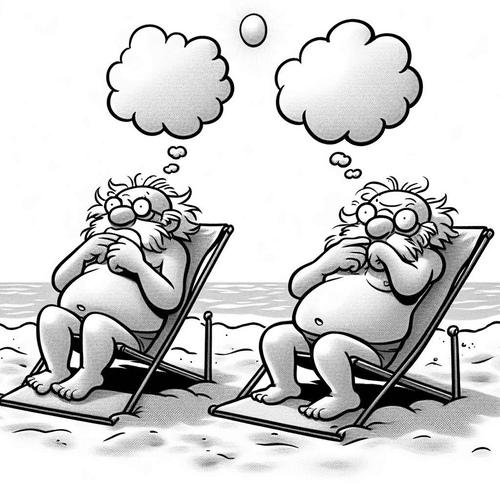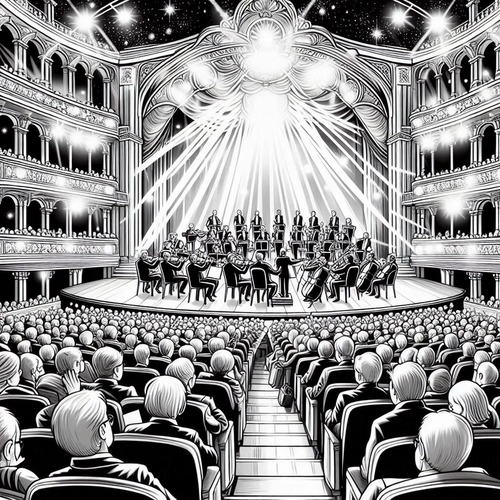The Ontological Argument: Can We ‘Logic’ Our Way to God?
Can We Logic Our Way to God?
For centuries, philosophers have grappled with the profound question of God’s existence. The Ontological Argument offers a unique approach, seeking to prove God’s existence through reason and pure logic. In this article, we explore two main variations of this argument. We shall also delve into a contemporary philosopher’s refined version of the argument.
Anselm’s Ontological Argument
Anselm of Canterbury, an 11th-century philosopher and theologian, formulated the Ontological Argument. His reasoning centres on the concept of God as the greatest conceivable being. Here are the key premises:
- Premise 1: We can conceive of a being with absolute perfection in every way, and superior to all other beings.
- Premise 2: Existence is a greater perfection than non-existence. A being that exists and possesses all perfections is greater than a being that merely has them conceptually.
- Conclusion: Therefore, the greatest conceivable being (God) must exist because non-existence would be a flaw.
The argument simplified: Imagine the most perfect being imaginable. Wouldn’t existence be an essential part of that perfection? If this most perfect being lacked existence, wouldn’t that be a flaw? According to Anselm, the most perfect being (God) must necessarily exist.
Descartes’ Ontological Argument
René Descartes, a 17th-century philosopher, also explored the Ontological Argument. His version focuses on the nature of ideas and existence:
- Premise 1: I have an idea of a perfect being (God).
- Premise 2: Existence is a perfection.
- Conclusion: Therefore, the perfect being (God) must exist. Because existence is a perfection, a perfect being wouldn’t lack this quality.
The argument simplified: Descartes emphasizes the nature of the idea itself. If we possess the idea of a perfect being, and existence is a perfection, then the perfect being must exist not only in our minds but also in reality.
Alvin Plantinga’s Modal Ontological Argument
Central Idea
Alvin Plantinga, a contemporary philosopher, refines the Ontological Argument by addressing criticisms levelled against the classical versions. His argument revolves around the possibility of a maximally great being and suggests its actual existence.
Key Points
- Possible Worlds: Plantinga introduces the concept of possible worlds—hypothetical universes with varying laws and properties.
- Maximal Greatness: A maximally great being possesses all positive properties in every possible world. It is omnipotent, omniscient, and perfectly good across all conceivable universes.
- Necessity and Actuality: If a property is necessarily true in every possible world where a certain kind of being exists, then that property applies to the actual being of that kind.
The Argument in Steps
- It is possible there exists a world (World W) where a maximally great being exists.
- A being can be maximally great only if it has maximal excellence in every world (meaning it has all positive properties in every possible world).
- A being has maximal excellence in every world only if it possesses omniscience, omnipotence, and moral perfection.
- If World W were actual, then a being with omniscience, omnipotence, and moral perfection would exist (following points 2 and 3).
- We haven’t disproven the possibility of World W being actual.
- Therefore, it is possible that a being with omniscience, omnipotence, and moral perfection exists (which, by definition, is God).
Objections to Plantinga, and the Christian Response
Objection 1: The Argument deals only with possibilities, not actualities, so it cannot definitively prove God’s actual existence.
The Rebuttal: Modal logic is a valid tool to explore the concept of necessary existence, which is key to Plantinga’s argument. The argument aims to show that if God’s existence is even possible, then God must exist necessarily by his very nature as a maximally great being. It demonstrates the logical coherence and possibility of God’s existence.
Objection 2: Existence is not a property that can be predicated of a being. So a “maximally great being” wouldn’t necessarily have to exist.
The Rebuttal: For God as a necessary being, existence is not just an accidental property but is essential to and inseparable from God’s very nature and being. Existing is a prerequisite for being truly maximally great and lacking no perfection. Non-existence would be a privation of greatness.
Objection 3: The argument assumes controversial premises about the metaphysical possibility of maximal greatness, necessary existence, etc. which non-theists reject.
The Rebuttal: The aim is to demonstrate the logical coherence of theism’s core claims about God’s nature from within a theistic metaphysic. Strong arguments can still have premises that some find controversial–that doesn’t make them logically inconsistent. The argument cogently reasons within its premises to a logically consistent conclusion.
Objection 4: The notion of “maximal greatness” or “maximally excellent being” is inherently paradoxical or incoherent and cannot ground a sound argument.
The Rebuttal: Maximal greatness refers to the greatest possible being in terms of having all perfections and no limitations. This is a coherent concept without implicit contradiction. Plantinga’s argument unpacks what properties a maximally great being must have.
Plantinga’s Argument in Perspective: In summary, Alvin Plantinga’s Modal Ontological Argument provides a compelling perspective on God’s existence. From a Christian standpoint, it reinforces the idea of a perfect, all-knowing, and all-powerful Creator who transcends all possible worlds. Some objections persist—critics, for instance, may challenge the notion of maximal greatness or the validity of modal logic. The argument, however, is unique because it combines sophisticated philosophical reasoning with overtly theological elements and has been praised for its careful development and clarity.
Conclusion
The Ontological Argument is a thought-provoking concept that makes us ponder the existence of God using just the power of logic. While critics may find flaws, its true strength lies in igniting our curiosity about life’s profound mysteries. This argument taps into humanity’s universal longing to understand our place in the cosmos. It beckons us to embark on a philosophical adventure, questioning the very nature of reality itself.
Related Reads:
- Aquinas’ Quinque Viae: Timeless Arguments for the Existence of God
- The Universal Moral Oughts: Signposts to the Divine
- The Kalam Cosmological Argument: A Quest for Cosmic Beginnings
- The Teleological Argument: Unveiling Design in a Universe of Wonder
- The Fine-Tuning Argument: Can Orchestras Compose and Conduct Themselves?
Editor's Pick

Christian Obedience: God’s Empowerment or an Act of Our Will?
Every Christian knows the struggle. You’re fighting a besetting sin—again. You’ve resolved to do better—again. And you’re wondering: Should I [...]

The Throne-Room Vision: Who Did Isaiah See?
The scene is unforgettable: Isaiah stands in the temple, and suddenly the veil between heaven and earth tears open. He [...]

The Angel of the Lord: Can We Be Certain It Was Christ All Along?
Throughout the Old Testament, a mysterious figure appears: the Angel of the LORD. He speaks as God, bears God’s name, [...]
SUPPORT US:
Feel the Holy Spirit's gentle nudge to partner with us?
Donate Online:
Account Name: TRUTHS TO DIE FOR FOUNDATION
Account Number: 10243565459
Bank IFSC: IDFB0043391
Bank Name: IDFC FIRST BANK






